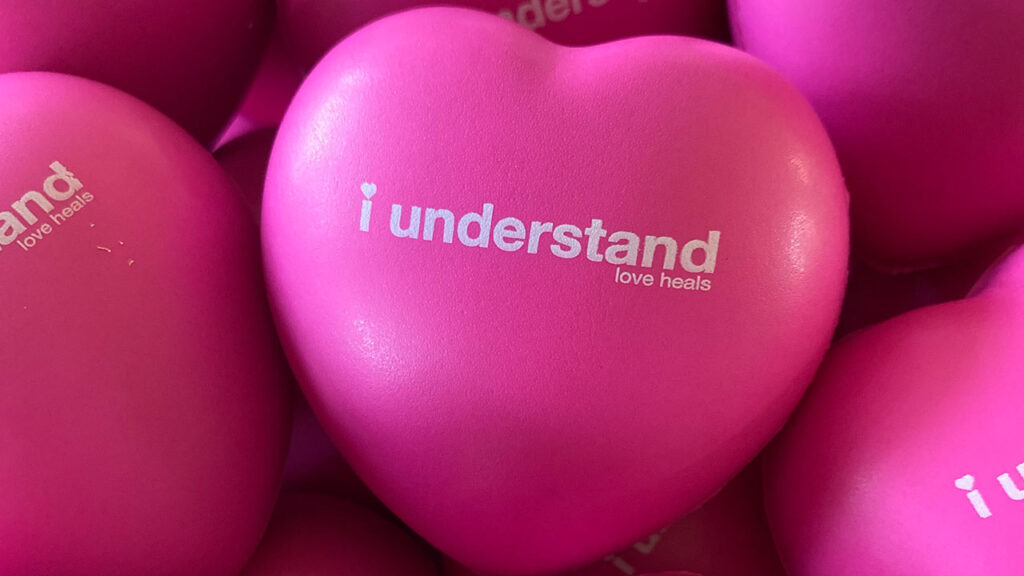When We Change Our Words, We Change Our Understanding
By Vonnie Woodrick

Our words shape how we see suicide, and how we see one another. When we change them, we open the door to compassion, healing, and hope.
When I think about suicide prevention, I don’t think first about statistics or campaigns. I think about people, about Rob, my husband, who died from depression.
When Rob died, people said he “committed suicide.” Those two words cut through my already broken heart. They sounded like judgment, as if love, illness, and despair could be reduced to a crime. But Rob didn’t commit a crime. And he wasn’t “crazy.” He was a kind, loving husband and father who died from an illness that he lived with—depression. I knew in my heart that Rob didn’t want to die; he wanted the pain to stop. That pain was real, relentless, and invisible. But unlike cancer or heart disease, it carried silence and shame.
Language and Loss
Over time, I began to see how much language matters. Words like “committed suicide” carry centuries of stigma, rooted in the idea of sin and crime. They suggest choice and guilt when in truth, suicide is the heartbreaking end of unbearable pain.
So, I began saying something different: “Rob died by suicide.”
That small change opened space for compassion. It allowed people to see Rob not as a statistic or an act, but as a human being, someone who suffered from an illness he never asked for.
And yet, I realized it wasn’t enough. We were still talking about the act, not the illness.
“My husband didn’t die by choice. He died of depression.”
“My friend’s daughter didn’t die by choice. She died from the effects of bullying.”
“My wife didn’t die by choice. She died from physical pain that became too much to bear.”
When we speak this way, we bring dignity to those we’ve lost and compassion to those who are still fighting.
We shift the question from “How did they do it?” to “Why did they do it?”
The Ripples of Grief and Love
There’s a photo of Rob’s granddaughters standing at his grave. They never met him, but they ask about him often. I tell them stories how he made us laugh, how much he loved to fish, and how deeply he cared for his family.
That photo reminds me that suicide doesn’t end one life; it changes generations.
It also reminds me of why I keep going. Every time I share our story, I hope to help one more person understand that suicide is not a choice, it’s the tragic result of pain that went unseen, untreated, or misunderstood.
And if you are struggling, please hold on to this truth:
You are loved. You are needed. The world is not better off without you.
Your life has meaning, even when you can’t see it. There is help, and there is hope.
Why the Definition Petition Matters
After years of speaking about language and stigma, I realized that awareness wasn’t enough. We needed a systemic shift one that redefines suicide not as a moral failing or a choice, but as what it truly is: the result of an illness or unbearable psychological pain.
Right now, suicide is officially defined as an intentional act of self-harm resulting in death. But if 54% of people who die by suicide never receive a formal mental health diagnosis, how can we call it “intentional”?
This question challenges the assumption that suicide is always a deliberate act. If more than half of those who die by suicide were never diagnosed with a mental health condition, it suggests that many were suffering silently, without recognition or treatment. Calling such deaths “intentional” oversimplifies a complex, medical, and deeply human struggle one that often unfolds without adequate support or understanding.
We’re missing the truth and losing lives because of it.
The Definition Petition calls for a new definition that recognizes suicide as:
A death caused by a mental or brain health condition and/or unbearable psychological pain.
Because pain is the common denominator in every suicide whether it comes from depression, trauma, addiction, grief, bullying, or physical suffering.
By including pain, we honor humanity in every loss. We make space for compassion, not condemnation. And we lay the groundwork for change:
- How we train first responders and coroners to speak with families.
- How we record causes of death and collect data for prevention.
- How we teach children that mental health is health.
Changing the definition isn’t just about words. It’s about systems, empathy, and the kind of world we choose to build.
For me, this change honors Rob not for how he died, but for how he lived with laughter, generosity, and love.
To learn more or support the Definition Petition, visit iunderstandloveheals.org/definitionpetition.
From Awareness to Action
The work continues every day. Awareness starts the conversation, but action changes lives.
That’s why I’m honored to be part of One Mind’s Lived Experience Community, a group of people using our lived experiences to drive real change. Together, we are turning personal pain into collective progress, influencing how the world understands mental health, and ensuring that compassion becomes the norm, not the exception.
My hope is simple: that one day, when we talk about losing someone to suicide, we’ll say:
“They died of depression.”
“They died from unbearable pain.”
Just as we say, “They died of cancer.”
Because when we change our words, we change our hearts.
And when we change our hearts, we change lives — or perhaps even save lives.
About the Author
Vonnie Woodrick is the founder of i understand, a nonprofit that offers compassionate education and support for those affected by suicide and mental health struggles. She is the creator of the Definition Petition, a movement to redefine suicide as a death caused by a mental or brain health condition and/or unbearable psychological pain, and a proud member of One Mind’s Community Advisory Network. Vonnie is also the author of The Power of Sharing, i understand: Pain, Love and Healing After Suicide, Change Can Be Beautiful, and an updated edition of Marshmallow Clouds. You can hear her voice and her passion for change on her podcast, Behind the Smile.
